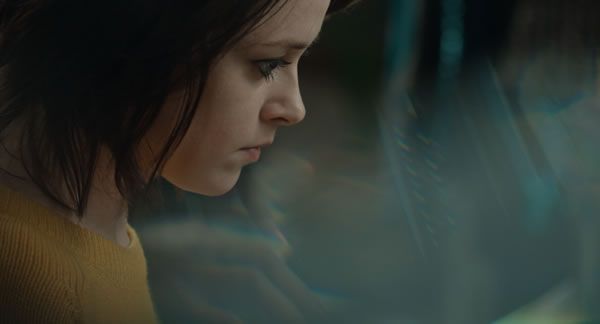
Synopsis:
A mysterious girl appears in the middle of a southwestern desert. As she acclimates to her new life, she discovers that she has a twin with whom she shares more than just an outward appearance.
Review:
Director: Natasha Kermani
Writer: Natasha Kermani
Starring: Lauren Ashley Carter, Neimah Djourabchi, Adam David Thompson
Themes of femininity and identity are not foreign subject matter in cinema. Coming of age stories circulating around first loves, blossoming sexuality, and independence can drive character development on a straight-forward, yet rebellious path exhibited in such recent films as Lady Bird or violently deviant from the norm like French powerhouse, Raw. However, writer/director Natasha Kermani approaches these themes delicately, in a dream-like manner where she crafts a uniquely artistic interpretation of feminine identity, sexuality, and acceptance in her captivating sci-fi drama, Imitation Girl.

Crashing into the New Mexico desert, an alien life-form assumes the physical appearance of young starlet Julianna Fox (Lauren Ashley Carter: Darling, Jug Face). Shying away from special effects makeup or saturated CG silliness reminiscent of other similar plot setups like John Carpenter’s Starman, the display of acquiring an attractive human form is subtle, yet still eerily disturbing. Donning a sexy negligee, “Imitation” stumbles to assimilate into her new physical form and aimlessly wanders throughout the vast openness until she eventually encounters civilization. She is embraced with kindness and concern by a bartender named Saghi (Neimah Djourabchi: Okja, After Earth), who provides her shelter and leaves her to rest. One may assume that a horrific element will be presented which does arouse tension; but no, what develops between the two is a charmingly refreshing love story and companionship founded on respect and intrigue.

Meanwhile, in New York City, Julianna Fox (also played by Lauren Ashley Carter) drifts through her life carrying a sense of emptiness and struggles with her porn star profession that is void of inspiration or purpose. Her boyfriend, Max (Adam David Thompson: A Walk Among the Tombstones) is a bartender and drug dealer whom Julianna eventually strays away from while diving deeper into the fast life of cocaine and sexual escapades. An opportunity arises when Julianna runs into her old piano teacher (played by beloved sci-fi royalty, Catherine Mary Stewart) who offers her an opportunity to audition for a musical role that can potentially alleviate her woes and allow her to fulfill the life course she truly wants but has derailed.
In stark contrast to the dismal challenges faced by Julianna, Imitation is thriving in her new experiences with Saghi and his sister Khahar (Sanam Erfani: Birds of Paradise) who teach her anything from basic hygiene skills, to cooking, to their native Farsi language. Imitation discovers Julianna on television one day and their paths are destined to cross, culminating in a hauntingly emotive final sequence.

Lauren Ashley Carter delivers two superbly powerful performances that are each distinctly strong in their own expressions and body language. The doe-eyed, ever curious innocence of Imitation is a quintessential character foil to the jaded and fiercely broken Julianna. Further supporting their polarity is Kermani’s use of symmetry and color palettes. The radiant warmth of Imitation’s world is exhibited through earthly shades of yellow, brown, and blue coupled with sunbeams and desert landscapes while Julianna’s world is displayed through alternating bleak, dark hues and vividly electric pigments against the frigid backdrop of New York City. The atmosphere both characters inhabit support their search for what makes them fulfilled whether that’s Imitation discovering her physical form while taking a hot bath, or admiring the shape of her newfound lover’s lips, or Julianna striving to advance her career while navigating her love life and overall purpose in the world. Symmetrical framing and symbolic color through both earthly and ethereal cinematography nurture these characters’ individuality, while cradling their emptiness and need for connection with one another to become whole.

The narrative is open to interpretation in many ways, yet also seemingly comfortable in its humanistic familiarity. The notion of feeling like an outsider is examined through multiple characters using elements of fear, curiosity, and love as driving forces. Kermani’s decision to tie in her Iranian-American lineage to further reinforce her feminine perspective is singular in its sincerity and authenticity. Another noteworthy component to the film that connects the emotional journeys together is the score, which is impressively composed by Kermani herself.
Imitation Girl is a gorgeous film that dissects the yin and yang nature of finding and ultimately accepting one’s self. While the pace is leisurely and the film is not straight-up horror, the notions and complex contradictions experienced on the path to self-exploration, sexuality, and individual freedom can in fact be horrific subject matter. However, thanks to cinematic gems like Imitation Girl, we can at least get a dose of hypnotizing, heartfelt beauty along the way.
Imitation Girl hits VOD on March 16th, 2018 and theaters April 20th, 2018.
 Horror News | HNN Official Site | Horror Movies,Trailers, Reviews
Horror News | HNN Official Site | Horror Movies,Trailers, Reviews





